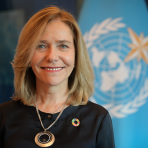Opening remarks on the occasion of the Dialogue Session “From the Bandung Spirit Water Summit to the UN 2026 Water Conference
Your Excellencies, distinguished colleagues, dear participants,
Good morning, a very warm welcome and thank you for being here today. It is an honor for the World Meteorological Organization (WMO) to host this important discussion on a topic that touches all our lives and is very close to our mandate — WATER.
Water is essential for life. It nourishes our bodies, feeds our crops, and sustains our environment. But today, water has also become a clear sign of the problems facing our planet.
Earlier this year, it was a great experience to participate in the Bandung Spirit Water Summit – an event that reminded us of how serious water issues are. Leaders and experts from around the world came together to emphasize that water is about more than survival—it is about building a fairer, safer, and more sustainable world.
As an organization focused on science and global cooperation, we know that the challenges with water can only be solved with strong partnerships, reliable data and information as the basis for clear action.
Dear colleagues, the science is very clear, and action is urgent.
WMO’s most recent State of Global Water Resources Report highlights how serious the situation has become:
2023 was not only the warmest year of record, it was also the driest year for rivers worldwide in more than 30 years of record-keeping. This had major impacts on communities, industry, agriculture and transport.
Glaciers, which are critical sources of water for billions of people, suffered their greatest water loss in 50 years of measurement. This is a major potential threat to future water supplies.
Our planet’s water cycle is out of balance, with severe droughts in some places and devastating floods in others.
These events are not isolated incidents. They are all connected and are getting worse because of climate change. A warmer atmosphere can hold more moisture, leading to heavier rain – often fueled by record ocean temperatures - and flooding. Droughts are becoming more severe. These changes affect everyone, especially vulnerable communities with fewer resources to cope and adapt.
Ladies and Gentlemen,
We cannot change the laws of nature, but we can change how we respond.
At WMO, we are fully committed to leverage science for action and for effective solutions.
We provide scientific and policy guidance on integrating water issues into the climate agenda.
We are focusing on several key steps, including:
- Improving how we observe hydrological processes and water resources. Good decisions need good data. WMO is working with countries to improve systems that continuously monitor the hydrological cycle.
- Encouraging countries to share water data and information, and to cooperate on cross-border water management. Water doesn’t follow national boundaries, so managing shared waters requires partnerships.
- Expanding the global “Early Warnings for All” initiative. By 2027, we aim to ensure that everyone on the planet is protected by early warnings for extreme hydrological events like floods and droughts.
- Promoting Integrated Water Resources Management (IWRM). This approach enables countries to manage water for all, more efficiently and effectively, while also advancing sustainable agriculture, renewable energy transition, and environmental conservation.
- Involving young people in water and climate solutions. The future depends on the next generation, and we are dedicated to empowering young professionals.
The Bandung Spirit also highlighted the importance of working together.
As co-coordinator of the UN-Water Expert Group on Water and Climate Change, WMO plays a key role in supporting the UN System-wide Strategy on Water and Sanitation, by providing scientific and policy guidance on integrating water issues into the climate agenda.
WMO and UNESCO, in collaboration with governments and relevant organizations, are also facilitating the implementation of the International Year of Glaciers’ Preservation 2025 and seeks to strengthen monitoring and protection of the cryosphere.
Looking ahead to the UN 2026 Water Conference, we have an opportunity to act boldly. This conference will be a chance to measure progress, identify and scale solutions that work, and ensure that no one is left behind. WMO stands ready to support, as we did for the UN 2023 Water Conference.
There is no time to lose. By working together, we can turn water from a source of crisis and conflict – into a force for hope, a bridge for cooperation and peace.
Let me close by thanking His Excellency Dr. Han Seung-soo, His Excellency Ambassador Achsanul Habib, and the Geneva Water Hub for their leadership in bringing us together today. I also welcome Her Excellency y Ms Retno Marsudi, first UNSG special envoy for water, what highlights the importance of multilateralism to face this important agenda.
Thank you very much, and I wish you all a productive and inspiring discussion.
Statement by


